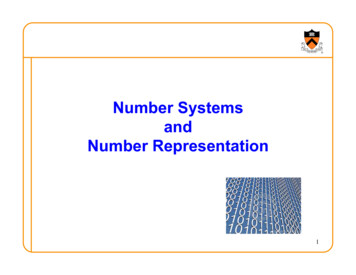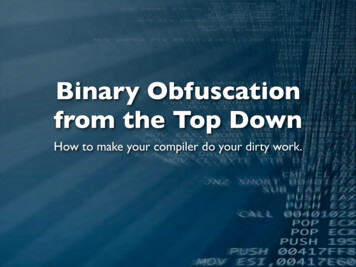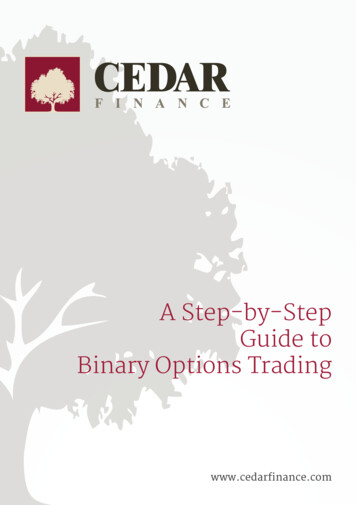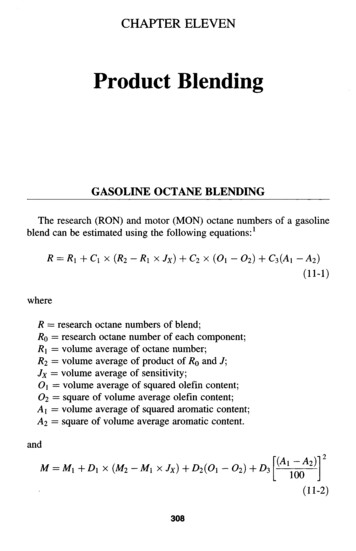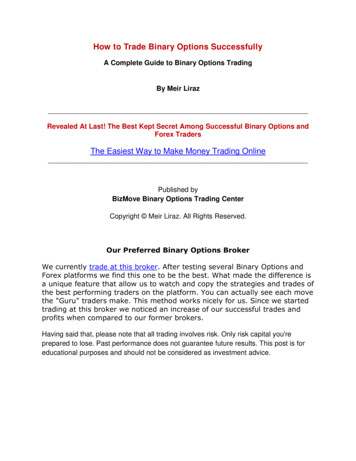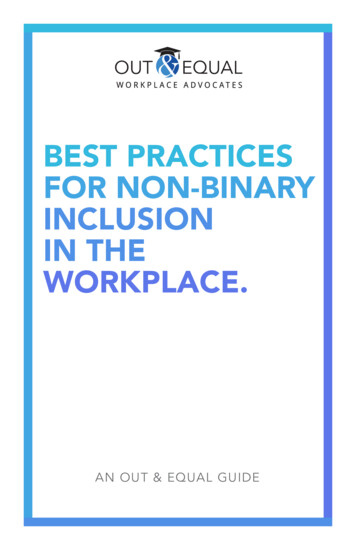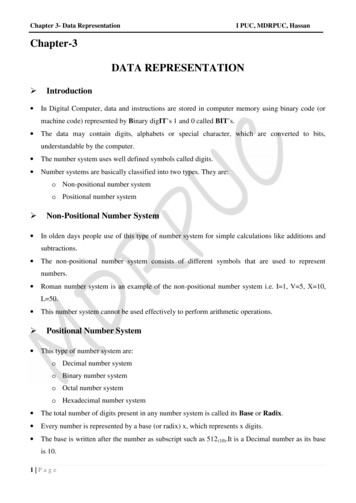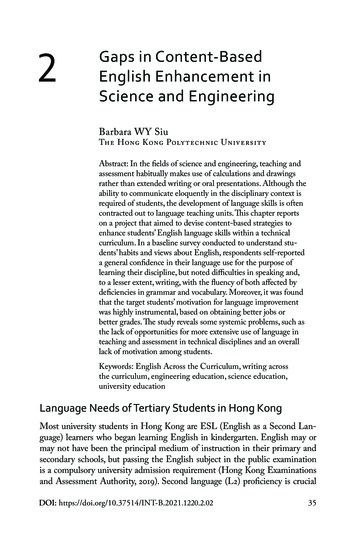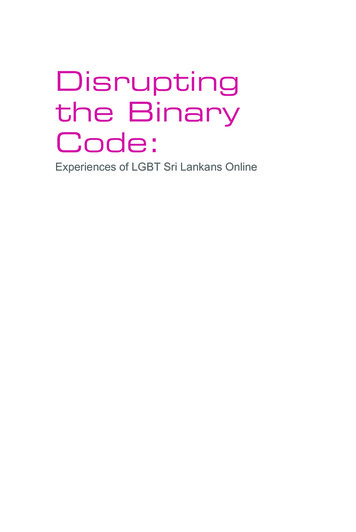
Transcription
Disruptingthe BinaryCode:Experiences of LGBT Sri Lankans OnlineDisrupting binary code: experiences of LGBT sri Lankans online1
Disrupting binary code: experiences of LGBT sri Lankans online2
Disruptingthe BinaryCode:Experiences of LGBT Sri Lankans OnlineWomen and Media CollectiveAssociation for Progressive CommunicationsAmplifyChangeandEROTICS South Asia: exploratory research on Sexuality and the ICTsDisrupting binary code: experiences of LGBT sri Lankans online3
Disrupting the Binary Code:Experiences of LGBT Sri Lankans OnlineFirst Print: December 2017(c) Women and Media CollectiveISBN 978-955-1770-33-4Production Team,Researchers and writersPaba Deshapriya, Michael Mendis,Dr. Shermal Wijewardena,Subha Wijesiriwardena,Dr. Sepali Kottegoda and Sanchia BrownReviewersJayanthi Kuru-Utumpala and Zainab IbrahimCopy editorAPCLayout and DesignVelayudan JayachithraPrintingGlobe Printing WorksResearch & publication support AmplifyChangePublished by:Women and Media Collective (WMC)56/1, Sarasavi Lane, Castle Street, Colombo 08, Sri LankaTelephone: 94112690201 Fax: 94112690192Email: wmcsrilanka@gmail.comWebsite: www.womenandmedia.orgFacebook: Women and Media Collective (WMC)Twitter: @womenandmediaYou Tube: Women and Media CollectiveAssociation for Progressive Communications (APC)P.O. Box 29755, Melville, 2109, Johannesburg, South AfricaTelefax: 27 11 726 1692Email: info@apc.orgWebsite: www.apc.orgFacebook: APCnewsTwitter: APC newsDisrupting binary code: experiences of LGBT sri Lankans onlineiv4
ContentList of Abbreviations.7Acknowledgements. 8Foreword. 9Chapter One : ‘Virtually Queer:Human rights of LGBTQ Sri Lankans in the online space’ .11Section 1: Introduction . 13Section 2: Background . 20Section 3: Sexuality and the Online Space in Sri Lanka . 29Section 4: Law and Policy . 66Chapter Two : Not Traditionally Technical : Lesbian women inSri Lanka and their use of the online space. 83Introduction. 85Methodology. 86Family Surveillance and Public Surveillance. 88Conclusion . Appendix A: Glossary of terms .112Appendix B: Survey Questionnaire.114Disrupting binary code: experiences of LGBT sri Lankans online5v
List of FiguresFigure o1: Gender Identity of survey respondents .17Figure 2: Sexual Orientation of survey respondents . 18Figure 3: Age of survey respondents . 18Figure 04: Education of survey respondents . 18Figure 05: Devices used by survey respondents .20Figure 06: Respondent’s access to the internet in terms of hours.30Figure 07: Personal details shared publicly on social media .40List of TablesTable 01: Accessing information on the internet . 32Table 02: Sharing information on social media .39Table 03: mentioning of SOGI online .40Table 04: including real name / images online . 41Table 05: number of profiles per individual online .42Table 06: use of profiles that don’t feature their real name orimage.43Table 07: online dating platforms .49Table 08: adverse online experiences .56Table 09: online platforms associated with identified experiences . 57Table 10: their relation to the person affected by the experience .58Table 11: response to the experience .59Table 12: resolution to the experience .59Table 13: methods used to increase security online . 61Table 14: activity on dating and hook-up platforms. 61Table 15: activity on dating and hook-up platforms . 61Table 16: meeting someone from a dating platform .62Disrupting binary code: experiences of LGBT sri Lankans onlinevi6
List of �–––––––Association for Progressive CommunicationsComputer Crimes ActCompanions on a journeyCriminal Procedure CodeExploratory Research on ICTs and SexualityFocus Group DiscussionInternet Service ProvidersLesbian, Gay, Bisexual, Transgender and QuestioningpersonsNational Child Protection AuthorityNon-Governmental OrganisationNational STD/AIDS Control ProgrammePublic Representation of Constitution ReformSexual Orientation and Gender IdentitiesTelecommunications Regulatory CommissionThe Joint United Nations Programme on HIV/AIDSWomen and Media CollectiveDisrupting binary code: experiences of LGBT sri Lankans online7
AcknowledgementsThe Women and Media Collective (WMC) would like to thank all therespondents who shared their stories and experiences, withoutwhich this research would not have been possible. We are alsoappreciative of all the stakeholders who gave their time in order toprovide the information that was required for the study. WMC alsograciously thanks the Association for Progressive Communications(APC) for the opportunity to conduct this study and for providingguidance and support throughout this research. Special thanks toJac sm Kee, Katerina Fialova and Valentina Pellizzer of APC for theirinvaluable support.We also wish to thank the lead researchers and authors – PabaDeshapriya, Michael Mendis (Chapter 1 - ‘Virtually queer: Human rightsof LGBTQ Sri Lankans in the online space’), Dr. Shermal Wijewardenaand Subha Wijesiriwardena (Chapter 2: Not Traditionally Technical :Lesbian women in Sri Lanka and their use of the online space) whileextending gratitude to Jayanthi Kuru – Utumpala and Zainab Ibrahimfor reviewing the research.WMC is also grateful to AmplifyChange for the financial supportprovided to carry out the study. We also thank our partners ofthe ‘EROTICS South Asia Network’: Point of View (POV), Mumbaiand LOOM Nepal for their support. WMC also thanks its membersDr. Sepali Kottegoda, Velayudan Jayachithra and Sanchia Brown fromthe project team; and Nelika Rajapakse and Vanamali Galappatti fromthe finance team.We also extend our thanks to the translators Gobinath Ponnuthurai andInoka Priyadarshani and proofreaders Sumika Perera and KuhanithyKuhaneshan. Our sincere thanks to Kosala Tillekeratne of GlobePrinting Works for the printing of this study.Disrupting binarybinary code:code: experiencesexperiences ofof LGBTLGBT srisri LankansLankans onlineonlineDisrupting88
ForewordThis book explores the relationship between internet rights andsexuality in Sri Lanka. The research for the book was supportedby the Association for Progressive Communication as part of a widerinquiry that included India, Nepal and Sri Lanka. The core area of theresearch looks at areas of ICT policies or practices in Sri Lanka thatimpact sexuality and sexual rights. The research focused on two areas:Access to the internet (including affordability and geography) andhow this affects Lesbian, Gay, Bisexual, Transgender and Questioning(LGBTQ) Sri Lankans usage of the internet for activism and, Censorship(by the state or internet service providers or institutions) of sexualcontent, including critical information on sexuality.The Sri Lanka study specifically looks at the ways in which the LGBTQcommunities access the internet whether as a means of communicatingwith others or as a site of activism. Given the fact that non-heterosexualand non-cis persons who are identified as LGBTQ live in a context wherehomosexuality is criminalized, the internet provides a key source ofcommunication for LGBTQ Sri Lankans. The study gives an overviewof the regulatory framework on ICTs in the country and the ways inwhich social norms that herald heterosexuality and stigmatise nonheterosexual persons are navigated by LGBTQ Sri Lankans throughsocial media platforms.The study is presented in two chapters. The first chapter, ‘Virtuallyqueer; Human Rights of LGBTQ Sri Lankans in the online space’ by P.M.Deshapriya and J.M. Mendis examines the landscape of ICT policy andsexual rights in the country. It provides a broad overview of the sociopolitical environment in which LGBTQ Sri Lankans live, the findingsof the survey questionnaire, focus group discussion and individualinterviews.The second chapter, ‘Not Traditionally Technical: Lesbian women inSri Lanka and Their Use of the Online Space’ by Shermal Wijewardenaand Subha Wijesiriwardena is a dedicated analysis of lesbian women’sengagement with the online. Through one-to-one interviews and afocus group discussion, this section brings to light the gendered andsexualized experiences of lesbian women’s online engagements.Disrupting binary code: experiences of LGBT sri Lankans online9
This pioneering study is a critical means for advocacy on ways in whichfreedom of sexual expression online can contribute to breaking taboosand amplifying the voices of sexual minorities in Sri Lanka.Sepali KottegodaWomen and Media CollectiveDecember 2017Disrupting binary code: experiences of LGBT sri Lankans online10
Chapter 1Virtually Queer:Human rights of LGBTQSri Lankans in the online spacePaba Deshapriya and Michael MendisDisrupting binary code: experiences of LGBT sri Lankans online11
Disrupting binary code: experiences of LGBT sri Lankans online12
Section oneIntroductionThe internet is hailed as a “vital communications medium”1 thatallows people to “seek, receive and impart information and ideas ofall kinds.”2 It’s most remarkable contribution has been to make publicdiscourse far more inclusive than ever before. The internet allows flowsof information at much lower costs, over much longer distances, andwith much less delay than any other communications medium in history,allowing more people to enjoy the benefits of communication, accessto information, self-expression and social networking. Moreover, theinternet has “multiplied and amplified the capacity of the most diversegroups to get information, engage in exchanges, politically mobiliseand overcome the passive mode of reception that characterised thepast logic of public sphere dynamics.”3Indeed, the UN Special Rapporteur on the Freedom of Expression hasreiterated that “the framework of international human rights law, inparticular the provisions relating to the right to freedom of expression,continues to remain relevant and applicable to the internet. Indeed, byexplicitly providing that everyone has the right to freedom of expression123La Rue, F. (2011). Report of the Special Rapporteur on the promotion and protection of the right tofreedom of opinion and expression. fIbid.Corrêa, S. et al. (2011). Internet regulation and sexual politics in Brazil. In Jac sm Kee (Ed.),Erotics: Sex, Rights and the Internet. Johannesburg: APC, 27. www.apc.org/en/pubs/eroticsresearchDisrupting binary code: experiences of LGBT sri Lankans online13
through any media of choice, regardless of frontiers, Articles 19 of theUniversal Declaration of Human Rights and the International Covenanton Civil and Political Rights were drafted with the foresight to includeand accommodate future technological developments through whichindividuals may exercise this right.”4Evidently the internet plays a vital role in improving the lives of allpeople. Yet, to LGBTQ Sri Lankans, the internet is especially important.For them, it facilitates friendships and relationships that are otherwisesystematically obstructed in the offline world. In stark contrastto this offline world, the internet also provides these people withunprecedented opportunities to express themselves and build theiridentities, both individually and collectively. As a source of information,the internet disrupts and undermines the wilful exclusion of LGBTQ SriLankans from public discourse. LGBTQ people online are also able toaccess a global body of queer art, while other representations of nonheterosexual and non-cisgender people in the mainstream media inSri Lanka continue to be flat and harmfully stereotypical. At the sametime, many who are engaged in a “movement” for LGBTQ rights in SriLanka bemoan the individualism engendered by the internet, and theadverse impacts this exerts on community organising and communitymobilising. Indeed, although it is widely said of the internet that, “Thevirtual and the ‘real’ cannot be separated [ ] as discrete spheresof social activity,”5 and that, “online and offline interactions andexperiences are seamless,”6 the findings of the present study on howthe internet is significant in the lives of LGBTQ Sri Lankans throw thoseclaims into some doubt.The first part of the study is presented in three substantivesections. Background provides a collated overview of the sociopolitical environment in which LGBTQ Sri Lankans live. The secondsection, Sexuality and the Online Space in Sri Lanka, discussesthe substantive findings of the survey questionnaire, focusgroup discussion and individual interviews. The third, Law andPolicy, deals with issues in the legal framework that contributeto and compound the issues discussed in the preceding section.The second part of the study is a dedicated analysis looking at howlesbian women engage with the online space. As one-on-one456La Rue, F. (2011). Op. cit., 14.Corrêa, S. et al. (2011). Op. cit., 23.Ibid.Disrupting binary code: experiences of LGBT sri Lankans online14
interviews and a focus group discussion showed, lesbian women’sonline engagements demanded to be treated as specifically genderedand sexualised experiences, while being classed, race-d and so on.Their approach to the online space was traced through with theawareness that they had to negotiate being hailed by a patriarchal andheterosexist social system.The outline of the research objectives, methodology and key limitationsfollows:Objectives1.To explore how the online space and services are utilised by LGBTQSri Lankans to enjoy their human rights.2.To explore the limitations and restrictions faced by LGBTQSri Lankans in their use and enjoyment of the online space infurtherance of their human rights.3.To identify key policy reforms that could ameliorate the conditionsof use and enjoyment of the online space by LGBTQ Sri Lankans.MethodologyThe study used a mix of research methodologies, both quantitativeand qualitative, which included:1.A desk review of internet policies, relevant legislative and licenseof internet service providers (ISPs) in order to understand theexisting attitude to access, and a review of the legal frameworkrelating to LGBTQ people in Sri Lanka.2.Semi-structured interviews with a cross-cutting range of 10stakeholders including the government sector (Law enforcement,National Child Protection Authority, Sri Lanka ComputerEmergency Readiness Team), the private sector (ISPs), civilsociety, for example LGBTQ organisations, groups and individualsand human rights activists.3.A focus group discussion with the members of the LGBTQcommunity and LGBTQ organisations in Sri Lanka. Venasa transnetwork, DAST group, Heart to Heart and Young Out Herewere among the organisations at the discussion. Apart fromthose groups, members representing academia, advertising,modelling and LGBTQ activists also took part in the discussion.Disrupting binary code: experiences of LGBT sri Lankans online15
Of 14 participants there were four trans people, six gay men, twolesbians and two bisexual men.4.An online survey of 85 responses to better understand how LGBTQpeople use and access the internet and what knowledge theyhave about online safety. The survey was designed in consultationwith community members and LGBTQ organisations. A total of32 female, 46 male, three trans and two gender non identifyingpeople responded to the survey. Respondents were reachedthrough LGBTQ organisations and groups. The survey wasconducted online to maintain the anonymity of the participants.5.The research was conducted by two (one male and one female)researchers. Both researchers have a positive rapport with theLGBTQ community in Sri Lanka and are recognised as advocates forthe decriminalisation of homosexuality and upholding the humanrights of sexual minority groups. Both researchers were presentat all the interviews except for one semi-structured interview inwhich the respondent requested to be interviewed by the femaleresearcher.Social media platforms and non virtual forums held in Colombo – i.e. acyber exploitation policy briefing by the United Nations and Sri Lanka,an online action group by the Child Protection authority – were alsostudied to gather information. The findings of the desk review werecross-checked during the focus group discussion and semi-structuredinterviews and were used to formulate the survey. Different sourcesof data were woven together for the purpose of this report thereforethe different methodologies do not stand alone in the report but as acombination of all.Constraints and limitations1.Information on government surveillance was unavailable due tolegal restrictions and there was no meeting with governmentrepresentatives responsible for digital infrastructure andimplementation. Requesting an interview on LGBTQ concerns wasnot appreciated and was mostly neglected by the governmentrepresentatives.2.Due to the uneven representation in the survey, cross-communitycomparisons were not feasible. Reaching out to the transcommunity proved difficult, possibly due to their lack of accessto the internet. Some of the difficulties in reaching the relevantDisrupting binary code: experiences of LGBT sri Lankans online16
demographic arose from the perceived criminality of homosexualityin Sri Lanka, which has driven most non-heterosexual and noncisgender Sri Lankans into lives of secrecy and silence, insulatedfrom the outer world.3.Despite efforts made, the research team was unfortunately unableto interview Equal Ground – one of the leading LGBTQ groups in SriLanka. This created a gap in the report especially in terms of cyberviolence incidents that this organisation records.4.The research team was unable to incorporate the discussionand events which took place in January 2017 on decriminalisinghomosexuality due to time constraints.Key findingsThe survey covered 85 respondents.DemographicsFigure o1: Gender Identity of survey respondentsThe survey was dominated by men, at 59.5% while 34.5% were women.Only 3 trans persons participated in the survey.Disrupting binary code: experiences of LGBT sri Lankans online17
Figure 2 : Sexual Orientation of survey respondentsResponding to the question on sexual orientation, most of therespondents 59.5% stated that they are only attracted to membersof the same sex. 28.6% stated that they are bisexual while 9.5% of therespondents said that the sex of a person is not relevant. Two transrespondents stated that they are heterosexual.Figure 3: Age of survey respondentsDisrupting binary code: experiences of LGBT sri Lankans online18
More than half of the respondents are between the ages of 25 – 34.were aged.Figure 04: Education of survey respondentsMost respondents had higher education qualifications, with 47.8% witha bachelor’s degree and 15.5% having a master’s degree. Only 11.9%stated that they had only passed an ordinary level exam.Disrupting binary code: experiences of LGBT sri Lankans online19
Section TwoBackgroundSexuality in Sri LankaIn Sri Lanka, non-heterosexual and non-cisgender people, identifiedas LGBTQ Sri Lankans in this paper, continue to live under a shroudof invisibility. Despite the continuous struggle for legal recognitionand reforms since the early 1990s, many people with these alternateidentities continue to live their lives in secrecy, away from governmentcontact, beyond the reach of community organisations and mostimportantly apart from each other.This state of invisibility and isolation is broadly a result of Sri Lankan“conservatism”, in which attitudes towards and discourses on sexualityand sexual relationships are heavily controlled by societal and culturalforces opposed to sexual and gender diversity.Sexual conservatism in Sri Lanka regulates individuals through genderroles based on a rigid, male/female binary construct; sex is restrictedby a “logic of reproduction”7. Sexuality is restricted to marriage, andthose who pursue sexual activity outside the confines of a marriage,especially women, are vilified. Sexual issues are “privatised” to such7Groundviews. (2016, 25 August). Submission on LGBTIQ Persons and Transitional JusticeMechanisms. Groundviews. g binary code: experiences of LGBT sri Lankans online20
an extent that discussion in the public sphere is discouraged. Sexeducation in public schools is virtually non-existent and only exists ina few private schools.8This conservatism exerts a significant influence on many aspects ofpublic life, especially in areas of legal and policy reform. However,behind this conservatism the private lives of many Sri Lankans who donot seem to conform to such values continues. According to the FamilyHealth Bureau, Sri Lanka records the best family planning performancein the region, with the contraceptive (all methods) prevalence rateamong “eligible families”9 registered with public health midwivesat 64.9%.10 For our discussion, the high contraceptive prevalencerate indicates that sexual activity among couples (married or livingtogether) clearly takes place outside the expectation of reproduction.In 2011, the Ministry of Transport reported that one in four womenexperienced sexual harassment while using public transport. Later thatyear, the Legal Aid Commission suggested that over 70% of women(between the ages of 15 and 45) were subject to sexual harassmentwhile using public transport. In 2015, the United Nations PopulationFund (UNFPA) Sri Lanka claimed that this number had increased toover 90%. Dr Sisira Liyanage, director of the National HIV Programme,stated that in 2015 23 students in schools became HIV positive throughunprotected sex, with 22 students contracting HIV in 2014.11 Mappingstudies estimate that there are approximately 35,000 to 47,000 femalesex workers and 24,000 to 37,000 men who have sex with men in SriLanka.In this context, prevalent narratives on sexuality and gender in SriLanka are constructed around the false assumption that all peopleare either male or female, which is determined exclusively by theirgenitalia, and that attraction to members of the opposite gender is the“natural” sexual inclination of all people.891011Women and Media Collective. (2015, 6 March). Country Profile on Universal Access to Sexualand Reproductive Health: Sri Lanka. Women and Media Collective. igible Family is defined as a family either legally married or living together where the womanis between 15 to 49 years and / or has a child under 5 years. A family with a pregnant orcohabiting woman irrespective of marital status and age and single women (widow, divorced,separated) are also considered under eligible family.Family Health Bureau, Ministry of Health Sri Lanka. (2013). Annual Report on Family Health 2013.Colombo. http://medicine.kln.ac.lk/depts/publichealth/Fixed Learning/annual report 2013.pdfBakamoono. How does accurate and comprehensive sexuality and relationship educationhelp prevent HIV? bakamoono. srupting binary code: experiences of LGBT sri Lankans online21
These assumptions have enabled widespread stigma and discriminationagainst non-heterosexual and non-cisgender people, succeeding indriving many of them underground, stifling their sexual expression andrelationships, marginalising them from accessing essential services likehealthcare, access to justice, education, etc., and condemning the mostvulnerable of them to lives of socio-economic and personal insecurity.Homosexuality and the lawThe key indicator of this stigma and discrimination lies in the PenalCode provisions, Sections 365 and 365A.The first section criminalises “carnal intercourse against the order ofnature”, and the second criminalises “acts of gross indecency” betweenpersons. These laws have been criticised for decades, and there havebeen repeated calls for their repeal since the mid/1990s.12 Although theprovisions remain formally unenforced since independence in 1948,13the necessity of their standing to preserve “public order and morality”has been touted by the government before the Human RightsCommittee in Geneva as recently as 2014,14 Even by the end of 2016,the Police continued to question and apprehend individuals under theprovisions to the extent that these are “valid” laws of the land.15A situation analysis by Equal Ground highlights Sections 365 and 365Aas a “tool to target and harass the LGBTQ community”.16 However,the analysis also stresses that, “parental, communal, and culturalsurveillance entangle with the law to maintain gender stereotypesand suppress expressions of alternate sexuality”.17 The report providesa concrete example of such “surveillance” on Sri Lanka: police considerthemselves authorised to arrest gender non-conforming peoplebecause the differences in their sexual and gender expressions indicate,121314151617Baudh, S. (2013). Decriminalisation of consensual same-sex sexual acts in the South AsianCommonwealth: Struggles in Context. In C. Lennox & M. Waites (Eds.), Human Rights, SexualOrientation and Gender Identity in The Commonwealth: Struggles for Decriminalisation andChange. London: Institute of Commonwealth Studies, Human Rights Consortium.Equal Ground et al. (2013, December). “There have been no convictions under 365 and 365Asince Sri Lanka gained independence in 1948.” Human Rights Violations Against Lesbian, Gay,Bisexual, and Transgender (LGBT) People in Sri Lanka. /LKA/INT CCPR ICO LKA 15986 E.pdfOutRight International, (2014, 20 October). Sri Lanka Government says LGBT Rights areConstitutionally Protected. OutRight Action International. tectedDIG Ajith Rohana, speaking at an event, High-level Dialogue on Human Rights and ConstitutionalReform. organised by FPA Sri Lanka and others. Colombo, 16 December 2016.Thangarajah, P. (2013). Strengthening of Legal Protection for LGBT in Sri Lanka: Road toDecriminalization. Equal Ground GROUND. issuu.com/equalground/docs/situation analysisIbid. text accompanying note 41. Emphasis added.Disrupting binary code: experiences of LGBT sri Lankans online22
to them, the “likelihood” of engaging in either “carnal intercourseagainst the order of nature” under section 365,18 or “acts of grossindecency” under section 365A. However, due to the practice of notformally charging people suspected of committing the offences, the“enforcement” of Sections 365 and 365A enables the police to subjectindividuals to arbitrary arrests, extortion, forced sexual favours, andsometimes even rape.19 Further, the existence of these laws preventssurvivors of such violence from reporting the crimes to the police oraccessing other remedial mechanisms.The law also enables many discriminatory acts beyond law enforcement,such as the refusal of accommodation by prospective landlords,20 therefusal of job opportunities,21 and even, as one writer reports, therefusal of advertising space in mainstream newspapers for LGBTQevents.22 Thus, the impact of the law reaches speech and conductwell beyond the acts specifically prohibited in the law. In fact, due tothe generally private contexts in which most sexual acts take place,Sections 365 and 365A are nearly ineffective against the criminalisedacts themselves. Still, even without enforcement, the laws act tosuppress the identities and relationships of people with alternativesexual orientation and/or gender identities.Section 399 of the Penal Code makes it an offence to cheat byimpersonation. A person is said to “cheat by impersonation” if hepretends to be someone else, or by knowingly substituting one personfor another, or representing that he or any other person is a personother than he or such other person really is. The police have been saidto arrest transgender people under this law.23 It has been
Disrupting binary code: experiences of LGBT sri Lankans online Foreword T his book explores the relationship between internet rights and sexuality in Sri Lanka. The research for the book was supported by the Association for Progressive Communication as part of a wider inquiry that
